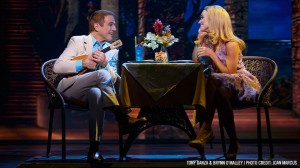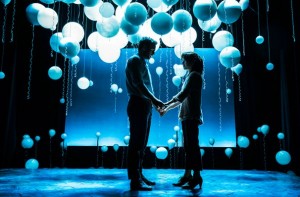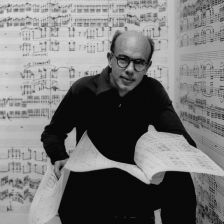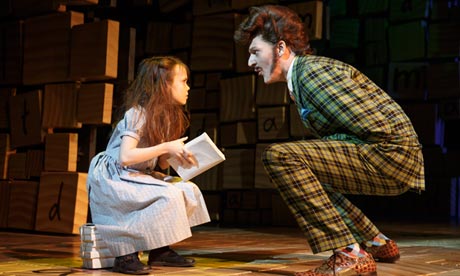 “In Berlin, Hitler very seldom went to the theater, except to see operettas. He would never miss a new production of the by now classical operettas such as Die Fledermaus and The Merry Widow. I am certain that I saw Die Fledermaus with him at least five or six times in cities all over Germany. He customarily contributed considerable sums from Bormann’s privy purse to have the operetta put on in lavish style.
“In Berlin, Hitler very seldom went to the theater, except to see operettas. He would never miss a new production of the by now classical operettas such as Die Fledermaus and The Merry Widow. I am certain that I saw Die Fledermaus with him at least five or six times in cities all over Germany. He customarily contributed considerable sums from Bormann’s privy purse to have the operetta put on in lavish style.
“In addition he liked revues. He went to the Wintergarten several times to attend a Berlin variety show and would certainly have gone more frequently but for the fact that he was embarrassed to be seen there. Sometimes he sent his house steward in his place and then late in the evening would look over the program and ask for an account of what had gone on. Several times he also went to the Metropol Theater which put on insipid musicals with plenty of scantily clad girls.
“During the Bayreuth Festival every year he attended every single performance of the first cycle. It seemed to a musical layman like myself that in his conversations with Frau Winifred Wagner he displayed knowledge about musical matters in detail; but he was even more concerned about the directing.
“Aside from Bayreuth, however, he very seldom attended performances of operas, and his initially rather keen interest in theater also dwindled. Even his enthusiasm for Bruckner never seemed very marked and imposed no obligations on others. Although a movement from a Bruckner symphony was played before each of his ‘cultural speeches’ at the Nuremberg Party rallies, for the rest he merely took care that Bruckner’s works continued to be fostered at St. Florian. He saw to it, however, that his public image of a man passionately devoted to art was cultivated.”
Albert Speer, Inside the Third Reich

 How good can a commodity musical ever hope to be? Is it possible to bring a well-remembered hit movie to Broadway in a manner that is both unpredictable and creatively fresh? Judging by “Honeymoon in Vegas,” the new Andrew Bergman-Jason Robert Brown stage version of Mr. Bergman’s 1992 screen comedy about an almost-married schnook who gets into a rigged card game with a gangster and ends up losing his bride-to-be, the jury is still out. The first act is gloriously fine, the second act much less so—but some of the show’s biggest problems stem from some of the casting rather than from the adaptation….
How good can a commodity musical ever hope to be? Is it possible to bring a well-remembered hit movie to Broadway in a manner that is both unpredictable and creatively fresh? Judging by “Honeymoon in Vegas,” the new Andrew Bergman-Jason Robert Brown stage version of Mr. Bergman’s 1992 screen comedy about an almost-married schnook who gets into a rigged card game with a gangster and ends up losing his bride-to-be, the jury is still out. The first act is gloriously fine, the second act much less so—but some of the show’s biggest problems stem from some of the casting rather than from the adaptation…. Nick Payne’s “Constellations,” which has moved to Broadway from London’s Royal Court Theatre, where it was premiered in 2012, starts out like this: A woman (Ruth Wilson) tries to pick up a man (Jake Gyllenhaal) at a party. He tells her that he’s in a relationship. A sound effect is heard and the action starts over. The woman repeats her pickup line, the man brushes her off in a different way, a sound effect is heard and the action starts over again—and again. The situation develops slightly differently each time, and by evening’s end the entire history of a marriage has been played out onstage.
Nick Payne’s “Constellations,” which has moved to Broadway from London’s Royal Court Theatre, where it was premiered in 2012, starts out like this: A woman (Ruth Wilson) tries to pick up a man (Jake Gyllenhaal) at a party. He tells her that he’s in a relationship. A sound effect is heard and the action starts over. The woman repeats her pickup line, the man brushes her off in a different way, a sound effect is heard and the action starts over again—and again. The situation develops slightly differently each time, and by evening’s end the entire history of a marriage has been played out onstage. The American composer Harold Shapero, who died two years ago at the age of 93, is a prime example of the perpetually rediscovered artist. He was extravagantly admired by his contemporaries, foremost among them Aaron Copland, who praised his “phenomenal ear” and “wonderfully spontaneous musical gift.” Bernstein gave the premiere of his Symphony for Classical Orchestra in 1948, then recorded it to thrilling effect five years later. Alas, the winds of favor blew elsewhere, and soon Shapero was devoting most of his energies to teaching instead of writing music of his own….
The American composer Harold Shapero, who died two years ago at the age of 93, is a prime example of the perpetually rediscovered artist. He was extravagantly admired by his contemporaries, foremost among them Aaron Copland, who praised his “phenomenal ear” and “wonderfully spontaneous musical gift.” Bernstein gave the premiere of his Symphony for Classical Orchestra in 1948, then recorded it to thrilling effect five years later. Alas, the winds of favor blew elsewhere, and soon Shapero was devoting most of his energies to teaching instead of writing music of his own….
